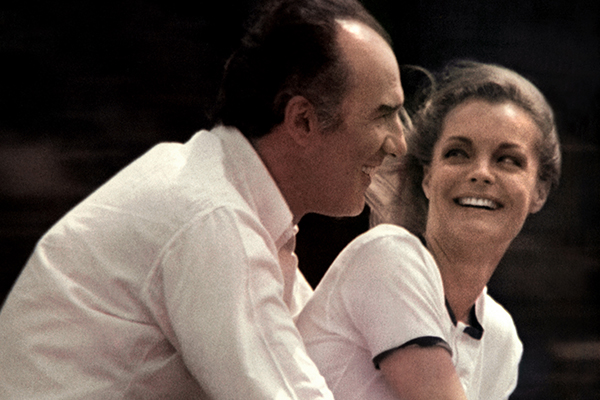The Première files By Thomas Baurez
The den of a thousand notes
PostED ON OCTOBER 11
The lair lies on the edge of the 17th arrondissement of Paris, far from the bustling crowds of hectic Parisian life.
It is the beginning of summer 2015 and I am paying a visit to Philippe Sarde. The musician has composed the score for Louis Garrel's first feature film, Two Friends, which has just been screened at the Cannes Film Festival. Sarde tends to make himself scarce, so I went with my heart pounding and in a terrible rush. "Dring". Philippe Sarde opens the door, and his baggy black t-shirt catches my eye. Then his shorts of the same colour. Everything is calm and relaxed. Luxury is hidden under the piles of souvenirs that occupy the walls, desk and the coffee tables. The host sits down in front of his computer. Behind him, I spy the word Tess beautifully handwritten on a scroll. His score for Roman Polanski's masterpiece has earned him an Oscar nomination, and this parchment is the proof.
 The Things of Life by Claude Sautet (1969)
The Things of Life by Claude Sautet (1969)
Where should we begin? With the film The Things of Life, of course. As he recalls and re-enacts his memories with a matchless sense of narrative, I feel his hands repressing an urge to tap to the tempo. An interview with the composer is necessarily accompanied by music. He often suspends his sentences in mid-air, while a melody emerges from the speakers to illustrate his point. La Chanson d'Hélène and its every beat, every breath, every detail - Philippe Sarde looks you in the eye to make sure you are there with him, vibrating with each note. Sometimes he presses the space bar on the keyboard, cutting short the lyricism. He changes tracks, isolating the instrument from the song. Romy disappears. Only the piano remains. Sarde explains, "I play my little melody for Claude [Sautet], and there is complete silence, a feeling emerges. Claude says, ‘Tell me, this melody only goes down, can you also make it go up?’ and I reply, ‘I can invent as many itineraries as you want!’”
And the composing is done with amazing speed. The theme of The Big Feast/La Grande Bouffe contains every style of music: rumba, piano solo or with the orchestra... I was even treated to Ugo Tognazzi's pasta prepared in the middle of the night with Marco Ferreri finding inspiration between two bites. The young Bertrand Tavernier, press attaché of the iconoclastic Italian filmmaker, was already around. Alain Sarde talks, opens secret doors and throws a rumba into the air to finish off the episode in style. That day, Chet Baker entered the room, high as a kite, but perfectly sober on his trumpet during the recording. Sarde comments that Belmondo wanted disco for his scene where he’s suspended from a helicopter, Johnny Hallyday wanted orchestration for his theme song to J’ai épousé une ombre and the primates of Quest for Fire needed to be tamed by the music. Everything goes quickly and nothing gets confused. I get up, thinking the session is over. Out of the blue, I mention the name William Friedkin, the previous "victim" of my column, pompously christened a "great interview", to whom Sardinia was to succeed. "Ah Friedkin! Sit down, I'll tell you a story... At that time, he was still in a relationship with Jeanne Moreau..." Luxe, calme… and flights of fancy.

